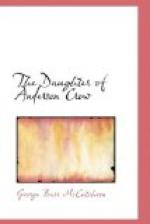“Doggone his hide,” roared poor Anderson, “fer two cents I’d tell all I know about him bein’ tight up at Boggs City three years ago. He couldn’t walk half an inch that time without staggerin’. Anyhow, I wouldn’t have chased Mr. Barnes that time if it hadn’t been fer Harry Squires. He egged me on, doggone his hide. If he didn’t have that big typesetter from Albany over at the Banner office to back him up I’d go over an’ bust his snoot fer him. After all the items I’ve give him, too. That’s all the thanks you git fer gittin’ up news fer them blamed reporters. But I’ll show him! I wonder what he’d think if I traced that baby right up to his own—What’s that, Eva? Well, now, you don’t know anything about it neither, so keep your mouth shet. Harry Squires is a purty sly cuss. Mebby it’s his’n. You ain’t supposed to know. You jest let me do my own deducin’. I don’t want no blamed woman tellin’ me who to shadder. An’ you, too, Edner; get out of the way, consarn ye! The next thing you’ll be tellin’ me what to do—an’ me your father, too!”
And that is why Anderson Crow resumed his search for the parents of Rosalie Gray. Not that he hoped or expected to find them, but to offset the pernicious influence of Harry’s “item.” For many days he followed the most highly impossible clews, some of them intractable, to supply a rather unusual word of description. In other words, they reacted with a vigour that often found him unprepared but serene. Consequences bothered Anderson but little in those days of despised activity.
It is not necessary to dwell upon the incidents of the ensuing years, which saw Rosalie crawl from babyhood to childhood and then stride proudly through the teens with a springiness that boded ill for Father Time. Regularly each succeeding February there came to Anderson Crow a package of twenty dollar bills amounting to one thousand dollars, the mails being inscrutable. The Crow family prospered correspondingly, but there was a liberal frugality behind it all that meant well for Rosalie when the time came for an accounting. Anderson and Eva “laid by” a goodly portion of the money for the child, whom they loved as one of their own flesh and blood. The district school lessons were followed later on by a boarding-school education down State, and then came the finishing touches at Miss Brown’s in New York.
Rosalie grew into a rare flower, as dainty as the rose, as piquant as the daisy. The unmistakable mark of the high bred glowed in her face, the fine traces of blue blood graced her every movement, her every tone and look. At the time that she, as well as every one else in Tinkletown, for that matter, was twenty years older than when she first came to Anderson’s home, we find her the queen of the village, its one rich human possession, its one truly sophisticated inhabitant. Anderson Crow and his wife were so proud of her that they forgot their duty to their own offspring; but if the Crow children resented




